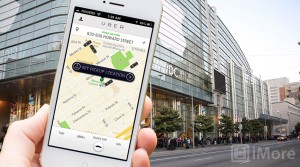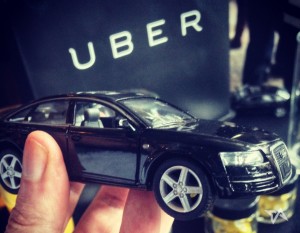 The multinational ride sharing corporation Uber has been a thorn in the side of government from the very beginning. Uber provides a quality service at an affordable price that the government-cartelized transportation industry just can’t match.
The multinational ride sharing corporation Uber has been a thorn in the side of government from the very beginning. Uber provides a quality service at an affordable price that the government-cartelized transportation industry just can’t match.
As true free market entities, companies like Uber, Lyft, and Sidecare operate outside of government regulation allowing customers to voluntarily choose from a variety of drivers in their area for their transportation needs.
The company’s smartphone app connects someone who needs a ride with someone willing to provide it. It’s already in use in 100s of cities in 55 countries across the world. And it’s very popular with riders, who generally pay less than they would for a cab, with faster service.
Uber drivers are subject to background checks, vehicle inspections, and insurance requirements.
But those aren’t the only steps taken to make sure riders aren’t harmed or scammed. The Uber app allows riders to rate drivers, data that becomes accessible to future potential passengers. If a driver is rude or reckless, he’ll get a poor rating, and riders won’t get in his car. Meanwhile, drivers can rate passengers as well.
This form of reputational enforcement has for the most part kept Uber safe.
Payments are handled electronically, through the app – no cash – with Uber getting a 20 percent cut. And because driver and passenger agree on a price before hand, passengers don’t have to worry about a meter or being long-hauled.
Providing people with a cheap and voluntary transportation option? No way says the French and South Korean governments who just conducted police raids on Uber offices in Paris and Seoul.
According to French media, 25 officers raided Uber’s headquarters for six hours on Monday, seizing emails, documents, and smartphones used by Uber drivers as part of an investigation into the companies UberPop service, deemed illegal by regulators under a new law that went into effect on January 1st requiring all chauffeurs to be licensed.
In Korea, Wednesday, Seoul Police arrested two Uber executives, and charged the company’s brand manager as well as at least 27 other employees and drivers for allegedly breaking the nation’s transport laws. The city previously declared that Uber’s services are illegal and vowed to ban it, going so far as to even issue a warrant for CEO Travis Kalanick.
South Korean officials are also probing the company over claims it failed to register its car-hailing app with wireless regulators.
Piggybacking on the actions of South Korea and France, UberPop has now been banned in Germany after a court decided the company ‘contravened’ German law. Judges are imposing fines of €250,000 for each violation of the order.
Wait, but I thought governments want to help the poor? Aren’t business opportunities and cheap transportation alternatives just what poor people need?
Without a large barrier of entry imposed via government licensing and regulation, every individual with a car is a potential small business owner. This is what regulation truly seeks to prevent – competition against established financial interests.
Regulations on transportation services are intended to protect consumers, but for the most part succeed only in raising prices and reducing quality of service, according to a report by the Mercatus Center.
 The report’s authors, economics professors Stewart Dompe and Adam C. Smith, contend that ridesharing services like Uber and Lyft are “revolutionizing taxicab and transportation services,” but have come under fire from “entrenched interest groups… [that] use government to protect their privileges and stifle market innovations”- a process known as ‘rent-seeking.’
The report’s authors, economics professors Stewart Dompe and Adam C. Smith, contend that ridesharing services like Uber and Lyft are “revolutionizing taxicab and transportation services,” but have come under fire from “entrenched interest groups… [that] use government to protect their privileges and stifle market innovations”- a process known as ‘rent-seeking.’
“The goal of rent-seeking,” the economists explain, “is to create higher profits by lobbying politicians to impose costly regulatory burdens, such as licensure, safety prescriptions, and price controls, on their new competitors.”
“It doesn’t take a lot of money to become a taxi owner-operator and earn more than $40,000 a year. One needs a car, an insurance policy and ancillary interior equipment to make a car a taxi,” George Mason University economics professor Walter E. Williams says. “In New York City, to be a taxi owner you’d have to purchase a license – called a medallion – that [now costs an average of $840,000 a piece]. New York’s Taxi and Limousine Commission restrictions that generate such a license price outlaw taxi ownership by people who don’t have access to [$840,000.]”
By contrast, in Washington, D.C., the annual fee for a license to own a taxi is around just $300. “I’ll let you guess which city has more taxis per capita, cheaper fares and more minority taxi ownership,” Williams says. “There are vested interests who benefit from keeping outsiders out and therefore enrich both companies with large fleets and single taxi owners at the expense of would-be owners and the riding public through higher prices.”
A spokesperson for Uber said Monday’s raid was an “attempt at intimidation” by the French government, and asserts their voluntary ride-sharing service is legal under French law. They have filed appeals with the European Commission.
In the statement, the company noted that the raid unfolded 48 hours after France’s supreme court referred “two key provisions” of the chauffeur licensing law to the country’s constitutional court. Uber says it plans to “vigorously defend the rights conferred upon it by EU law and the French Constitution.”
Uber is expected to fight the actions of the South Korean and German governments as well. In reference to Germany, a spokesperson said the company would appeal the court’s decision and, in the meantime, introduce an “alternative ride-sharing service being developed specifically to fit the court’s interpretation of existing regulations.”
UberPop remains available in France, though some 250 chauffeurs have been fined since the beginning of the year.
 In recent months we have seen more and more targeted law enforcement operations geared toward ensnaring drivers of Uber and Lyft, especially in the United States.
In recent months we have seen more and more targeted law enforcement operations geared toward ensnaring drivers of Uber and Lyft, especially in the United States.
Police in Madison, Wisconsin appear to be conducting routine rounds of sting operations on ride sharers. Back in April, an operation resulted in $1,300 in fines for drivers and in August, a second operation netted $1000 in fines for the department.
Officers in plain clothes used apps to summon rides and then cited the drivers for violating the city’s taxi ordinances and for transporting passengers for hire without a license.
A police captain in the traffic division said at the time that the fines were meant to “send a message that the city was not going to tolerate their operation without licensing.”
After police in Pittsburgh issued dozens of tickets, with penalties varying from $25 to $300, to drivers for operating without licenses, judges issued cease-and-desist orders to both Uber and Lyft after the Pennsylvania Public Utility Commission filed a petition against them on June 16 of last year.
Since then, Uber won an experimental license to arrange private rides throughout much of Pennsylvania, a victory that came with a warning “to abandon its anarchist ways” and comply with state regulators.
The Philadelphia Parking Authority has been sparring with Uber drivers, impounding cars and issuing $1,000 fines. The agency considers them unlicensed cabbies because they do not have taxi medallions, which can cost as much as a half-million dollars in the city.
Officers working with the city Department of Transportation have also conducted stings in Austin, Texas.
In October, at least five drivers, four in Las Vegas and one in Reno, Nevada, were cited by regulators for a combined total of up to $10,000 in fines.
One driver relayed the experience describing five unmarked white Nevada Taxicab Authority vehicles surrounding his blue Ford Focus as he was driving east on Fashion Show Drive about 3:30 p.m. He was pulled over while trying to drop off two passengers. Two undercover officers wore black ski masks.
“It’s like a sting. It was crazy, man. They had one cop on the front telling me to get out of the car, if I had any drugs. It was wild,” the man said.
In January, a sting operation netted six Uber drivers who were fined more than $44,000 by Palm Beach County officials in Florida.
Other operations and bans have been launched around the United States in cities like Tuscaloosa, Alabama, Tampa, Florida, Boston, Massachusetts, Portland, Oregon, and many others.
Source Article from http://www.copblock.org/116194/uber-raided-by-police-in-france-and-south-korea-banned-in-germany/
Uber Raided By Police In France And South Korea, Banned In Germany

No comments:
Post a Comment